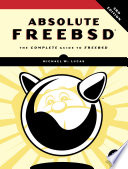Book Review - Absolute FreeBSD, 3rd Edition

Absolute FreeBSD, 3rd Edition
Michael W. Lucas
No Starch Press, 2018
ISBN:1593278934
ISBN-13: 9781593278939
Overview
When I began looking around for information on FreeBSD, Michael W. Lucas' book, Absolute FreeBSD, seemed to be at the top of just about everyone's list of "must read" books. I think I know why.
I've read a lot of technical books over the years. These books tend to run the gamut from overly simplistic to so technical I'm not even the author understood what they were writing. Most are rather dry. Michael Lucas though, seems to have struck just the right blend of technical, humorous, and "dummy". I took the time to read this book almost from cover-to-cover. I admit I skipped the last few chapters as they didn't seem to apply to me. I did skim them, however, so that I would have an idea of what they contain. If I need that information later, I know I can find it.
FreeBSD, as all the BSDs and Linux, is a unix-like system. This means that there's significant overlap between how things are done in this OS versus others in that domain. This has the advantage of both allowing the reader who has some experience in unix-like systems (e.g. Linux) to call on their prior knowledge and experience in understanding the concepts, and allowing the reader who maybe doesn't have quite that same level of experience to develop knowledge that can be transferred to other systems.
Lucas takes you through the entire system, even to explaining how to report bugs and participate and contribute to the project. I think this is the first time I've seen that kind of coverage in a book. When you've completed the book you'll have a pretty sound understanding of such things as the kernel, the boot process, how networking works and how to configure it, how to secure the system, partitioning disks and setting up the UFS, ZFS and other filesystems and so on. He even takes you on a tour of the /etc directory, explaining what each of the configuration files in that directory do and how to configure them (mostly). He takes you through installing software using both the package system and ports. Monitoring system performance is yet another area that he covers well. He does touch on Jails, though I didn't really feel like I had a good understanding of how to approach that (he has another book that goes into more detail on jails) and behyve doesn't appear to have been addressed, unless I missed it.
What I Liked About the Book
- Easy to read
- Thorough enough to make the reader feel comfortable in administrating the system without being overly technical or bewildering
- Great humor!
- Provided solid explanations and examples throughout that you could follow to get 'hands-on' practice
What I Didn't Like About the Book
- Hmmm... this is a hard one.
- I would have liked more information on behyve, which is the virtual machine system for FreeBSD. It is mentioned but never fully explained.
Do I Recommend the Book?
If you are interested in FreeBSD I join the host of others who have recommended to book strongly. Even if you're not interested in FreeBSD specifically, I still recommend it as a great book for building a solid foundation for understanding other unix-like systems.
Bear in mind that even though there are a lot of similarities between the various BSDs and with Linux, there are also many areas where the systems diverge. Consequently, you can't necessarily simply plop examples provided in the book into a different OS and expect them to work flawlessly. That said, with a solid foundation, you should be able to quickly recognize the differences and make the relevant adjustments.
I do recommend taking your time in reading this book. There's a lot of information to digest and the more you think about what is presented, and especially if you can follow along with the examples on a test system, you'll come away with a pretty significant foundation in FreeBSD!